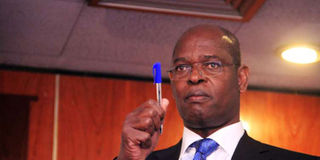Kinisu’s survival will hinge on the dexterity of his political footwork

Philip Kinisu, the chairman of the Ethics and Anti-Corruption Commission (EACC), at a press conference that he held at Laico Regency Hotel in Nairobi on July 19, 2016 to respond to allegations about him, a family company in which he is a director, and an international non-governmental organisation in which he is chairman. He said that he would not resign from his position at the EACC. PHOTO | DIANA NGILA | NATION MEDIA GROUP
What you need to know:
- Once—and if—he accepts to step aside, powerful individuals will then send emissaries to give him an ultimatum: resign or face investigations, which will never end.
- When the mission is accomplished, the stage will then have been set for another round for a search for a new chairman for the EACC. This boring ritual is how the EACC remains completely exposed as an institution that has long lost its independence from the Executive.
Mr Philip Kinisu assumed the helm of the Ethics and Anti-Corruption Authority in January this year with solid credentials.
A former head of African business for PricewaterhouseCoopers, the largest professional services firm in the world, and a man with a wealth of experience and training in forensic auditing, his appointment generated high public expectation.
Unlike his predecessors, he is a fairly wealthy individual, his flagship an expansive property complex in the Hurlingham area by the name Kones Heights.
When I engaged him in a one-on-one conversation in April, this year, he came through as a man who had weighed the risks and challenges of the office carefully, especially the politics, the fiefdoms within the organisation itself, and the need to restore clear lines of command within the country’s epic anti-corruption agency.
He gave me fresh insights into the problems at EACC and lamented about lack of capacity in investigating complex transactions, about the backlog of corruption complaints, and what needed to be done to clear the backlog cases. He had fresh ideas on how he intended to promote closer cooperation and information sharing between the EACC and other investigating and auditing bodies.
When we parted company, I made a mental note: his biggest mistake was to assume that his appointing authorities had indeed been serious about fighting grand corruption when they gave him the job.
When we appoint a new anti-graft czar, especially a person like Kinisu who has had a long career working for reputable international institutions, our true intention is merely to hoodwink our friends and allies in the West and to present an appearance of genuine commitment to fighting graft.
Secondly, I was also left with the distinct impression that the man had underestimated the tenacity of powerful insiders within EACC itself. Corruption is all about a network of operatives sharing rewards and risks with corrupt outsiders.
The reason the turnover of anti-corruption czars in this country has been high is because grand corruption is practised by networks of operatives with high stakes in keeping corruption hidden, operatives who will go to great lengths to freeze out critics and whistleblowers.
Two years ago, the machinations of these networks played out in a vicious battle for control of the EACC that pitted its former chairman, Mr Mumo Matemu, and his team of commissioners on one hand, and members of the secretariat on the other. That battle ended up in the exit of all the commissioners, setting the stage for the appointment of Kinisu and a new crop of commissioners.
POPULAR WISDOM
Later, it was to emerge that contrary to the popular wisdom of that time, Matemu and commissioners Irene Keino and Jane Onsongo had not left office voluntarily, they had actually been forced out of office through hostile machinations by powerful politicians working in cahoots with their allies from within the EACC’s secretariat.
Right now, Kinisu finds himself completely cornered, facing investigations on issues which, although still unproven, have given his enemies fodder to start pressing for his exit.
He will have to display a great deal of dexterity in his political footwork to win the battle.
In the coming days, we are going to be taken through the all too familiar game. It will start with orchestrated choruses calling on the man to “step aside” to make way for investigations.
Once—and if—he accepts to step aside, powerful individuals will then send emissaries to give him an ultimatum: resign or face investigations, which will never end.
When the mission is accomplished, the stage will then have been set for another round for a search for a new chairman for the EACC. This boring ritual is how the EACC remains completely exposed as an institution that has long lost its independence from the Executive.
In his defence, Kinisu has said that the conflict of interest charge against him cannot stand because all the contracts between Esaki and the National Youth Service were won and performed prior to his appointment as chair of the EACC.
He says the money laundering allegations against APCRH, the NGO that he chairs have never even been disclosed to the organisation.
He laments how barely a month after he was appointed, a high calibre gun fitted with a silencer was fired into his private office; how he, at one time, discovered that he had been under illegal surveillance.
His attempt to conduct life-style audits of EACC staff through vetting was blocked. Who cares?




